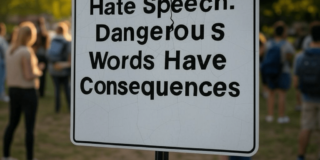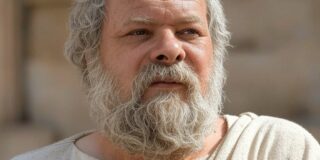Oedipus Tyrannus is perhaps the most famous of all Greek tragedies, primarily because in the fourth century BCE it was held by Aristotle in his Poetics to be a paragon of tragedy and then in the twentieth century CE to have entered the psychoanalytical vocabulary of Sigmund Freud in his Interpretation of Dreams.
We all know the story about a young child condemned by fate to marry his mother and kill his father. Oedipus tries to avoid his fate by leaving the home of his supposed parents only to meet a stranger on his journey. He came to a place where three roads met and was nearly run down by a noble man in a chariot and his entourage. Oedipus kills the man in recompense for the insult. After continuing on his journey he meets the Sphinx, solves her riddle and saves Thebes from a terrible plague. After entering Thebes he meets the recently widowed wife of King Laius the recently murdered ‘tyrant’ of Thebes. Oedipus marries King Laius widow Jocasta. I’ll let Sophocles finish his story.
Oedipus seeks assistance from the old blind prophet Tiresias. When Tiresias enterers the stage he calls Oedipus blind and says, “Your ears and your mind are as blind as your eyes.” He spits out the truth at Oedipus and tells him that he has married his mother and foretells that he too will be blind and wander as an exile. The lesson here is the same lesson that Marx tried to teach us, namely that we think we have no control over things that are actually our choice and that the things we think we do by choice are actually the result of our place in society, which is not so different from the lesson of Oedipus.
I chose to start this post about Marx, Communism and the role of Marxism in interpreting current historical events with reference to Sophocles rather than Marx, because one of the major obstacles in reading and coming to terms with Marx is that we as readers feel compelled to take sides, to reject to embrace him. The reality however is much different; we can simply learn from Marx without signing up to, or rejecting him out of hand. The relevance of Marx today is that he thought in terms of the movement of history and believed that his time could best be thought of as a transition between an age in decline and a new one yet to be born. He viewed capitalism both as a stage of history and as an agent of change. His works therefore suffer from an inbuilt ambiguity that is difficult at times for us to keep clear. Marx saw capitalism not only as a problem and as the source of many of the problems of his time, but also as a necessary stage of human development. Marx was not against capitalism per se, but rather viewed it in terms of the revolutionary changes that it introduced, arguing that capitalism was itself a historical event in transition.
More importantly, Marx argues that because politics is always about the power relationships that exist between the strong and the weak that our assumptions about history and change are political; they are both reflections of who we are and at the same time, existing power relations are propped up by what we tell ourselves about what is necessary and what is our choice. Marx tells us that the things that we tell ourselves are matters of choice, are usually conditioned by our place in society and the things we tell ourselves are necessary, are usually really decisions that we make. In other words, we usually get this backwards, the fate of Oedipus being but one classic example of how we get the concepts of choice and necessity backwards
The Communist Manifesto begins with the famous phrase, “A spectre is haunting Europe—the spectre of communism.” He portrays the Communist Party partly as both an actual party and a world-historical movement propelled by a force independent of particular situations. Communism represents something that scares everyone and that has taken on a life of its own.
Unlike other political theorists who want to believe that politics is more than one group imposing its will on another, Marx insists that, in fact, that’s all it is.
“The history of all hitherto existing society is the history of class struggles…”
That is all there is, he tells us and the key to understanding any given moment in history is to discover these struggles. Whether we look at ancient Rome, the Middle Ages, or modern times, politics is about the struggle between the oppressor and the oppressed. The key to understanding the present time, according to Marx and Engels, is to discern in an honest way the destructive and revolutionary power of capitalism. Consider the changes that all of us have seen in the last twenty years, as jobs move overseas, as globalization transforms every aspect of our lives. Marx tells us that these are not random or isolated changes, but the result of the destructive force of capitalism. Capitalism itself is not even the result of a particular economic system so much as a force driving history in ways that sound incredibly modern.
The bourgeoisie, according to Marx and Engels, have changed everything into a financial transaction. Work, family, religion, and art have all become financial arrangements. Tradition and custom hardly mean a thing because they have given way to the needs of capitalism and the bourgeoisie. Where we live, what we do for a living, and who we marry are all driven by economic needs. The bourgeoisie:
“…has converted the physician, the lawyer, the priest, the poet, the man of science, into its paid wage-earners. The bourgeoisie has torn away from the family its sentimental veil, and has reduced the family relation into a mere money relation.”
Marx and Engels use strident prose and dramatic pronouncements to propel the work forward. The prose and rhetoric of the Manifesto mimic the relentless drive of capitalism through history, sweeping away all criticism and hesitation. Marx and Engels argue that capitalism has stripped human relations to the barest of essentials; it’s all about money. He also personifies capitalism by referring to the bourgeoisie, who think of themselves as normal, matter of fact, common sense people, but who they say misunderstand their class position. The bourgeoisie like to think of themselves as a universal class—think about the way modern politicians try to appeal to the middle class—but Marx and Engels portray them as catalysts of change who do not see the exploitation that their success rests on.
Readers are tempted to reject Marx altogether because they do not find his vision of communism to be convincing. But at a time when the forces driving events seem out of our control, Marx challenges us to understand that the relations of power driving events today are not remote, but are played out in our everyday relations of work and commerce and even in our understanding of who we are and why we do what we do. Even if we don’t call ourselves Marxists and even if we are not ready to renounce capitalism, we might still benefit from reading him as a theorist who encourages us to think about what we can do to change the world and to think critically when we tell ourselves we are powerless in the face of world events.
The decisions we make as consumers effect the lives of indigenous people living in West Papua, Australia and Africa. Our decisions to support clothing manufacturers whose production centre around the exploitation of child labor in developing countries reinforce and allow to thrive production methods that are destructive and exploitive. Our everyday choices in how and what we spend our resources on impact directly on decisions by companies such as Freeport or Rio Tinto to destroy or not to destroy indigenous lands, peoples and culture in the pursuit of profit.
Make no mistake, every decision you and I make as middle-class consumers in developed economies has the potential to adversely or positively impact on the lives of the poor, distressed and vulnerable in developing economies. These decisions we make everyday form part of the forces driving events that seem out of our control, the challenge that Marx offers is to understand the impacts our decisions have on others. With understanding comes the opportunity to change the way we think and act, the way we do business and the values that are important not only to us personally, but to us as good global citizens.
| Will you sign the petition calling for a Royal Commission into the Australian Federal Police? |



Bring on the revolution.
I really think that the world really should shed a tear over the death of Communism. Even though the discredited by the Soviet experiment, Communism offers a valid alternative to the capitalist paradigm.
Bakchos Glass so what Uncle Mick Glass says is true, you are a closet pinko, or maybe not so much in the closet!
But did he accept All’ah?
Sally, he’s neither pink nor a capitalist. Intensify your hue!